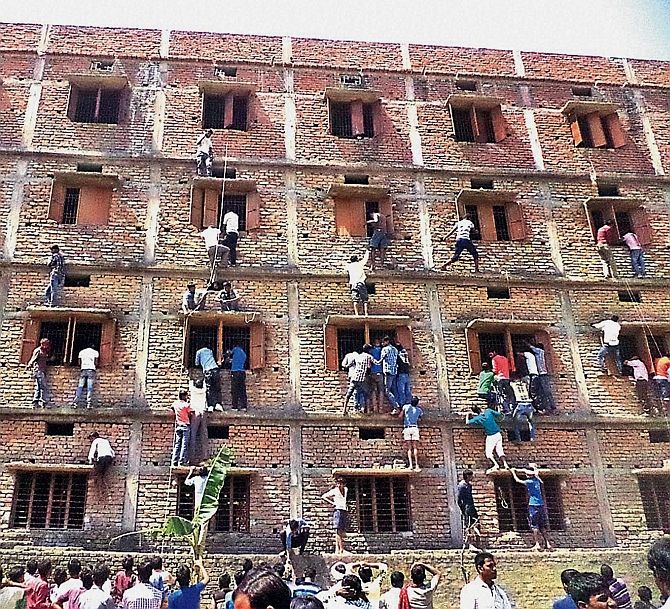Top universities should stop taking students from UP and Bihar to make these states act against the rampant mass cheating in school exams, suggests Anjuli Bhargava.

Fifty-seven students and 14 teachers were booked for mass cheating in Uttar Pradesh’s Mathura and Agra districts last week. Pictures and videos showed friends and relatives of the students scaling walls and passing chits through windows at the examination centres. Students were caught blatantly copying from each other.
According to newspaper reports, an organised network helps students write examinations in return for money. Invigilators were booked; so was the chief superintendent of a centre. On learning of the incident, the deputy district collector visited an examination centre in Mathura. How ineffective the authorities in the state are is evident from the fact that he was attacked and his vehicle was damaged as locals pelted stones.
The whole incident is a repeat of what happened in Bihar last year when photographs of mass cheating and relatives scaling high walls to help students with chits made international headlines.
Despite the worldwide ridicule, the state government failed to take stern action against the students. Although the government holds the right to debar students from taking examinations for up to three years, jailing or charging a fine, no action of this sort was taken. The government, on its part, claimed that it had expelled several students. But most suspect that the punishment was primarily on paper. If the authorities concerned had taken stern action a year ago, we might not have seen a repeat in UP.
Shifting the blame from the state to the parents, Bihar’s education minister expressed the state’s helplessness -- he was quoted as saying, ‘What can the government do to stop cheating if the parents and relatives are not ready to cooperate? Should the government give orders to shoot them?’
Shooting may be an extreme punishment, but there’s no reason why the culprits should get off scot-free. I have a couple of suggestions.
Let all institutions financially supported by the central government and various other state universities refuse or place a ban on students from Uttar Pradesh and Bihar till such time that the state governments are able to get their act together and prove the sanctity of the examination system.
There is no reason why a student from Bihar or Uttar Pradesh board should be placed on an equal footing with a student from Delhi, Mumbai, Kolkata, Kerala or any other state where such incidents are rarely found. On what basis can the results of the student from one of these states be treated on a par with the other state boards?
If this is the scale of cheating as has been reported, one shudders to think how much goes unnoticed or unreported. If teachers and invigilators have to be brought to book and parents and relatives are in cahoots, the problem may be more endemic than we think.
If for any reason a total ban is not a ready option, let’s start with a 10 per cent penalty on the final results. So, if student scores 90 per cent marks in Bihar or Uttar Pradesh, let him be treated on par with a student from other states with 80 per cent: a 10 per cent penalty for the lawlessness of the state machinery and a student and parent body that seems devoid of basic morals.
There's no reason why Delhi or any other university cannot issue a decree stating that in light of these incidents, it cannot continue to treat these students as they were treated in the past because that amounts to penalising the rest, the ones who do not employ unfair means.
This may not fully stop the menace, but it will be a powerful check since one of the main reasons students -- encouraged and abetted by parents -- cheat is that they are looking to get out of the state at any cost and study in institutions outside of Bihar and Uttar Pradesh.
Higher education institutions in these states are pathetic, and parents and students are willing to do anything -- including cheating -- to escape them.
So to answer the minister's question, the state government can start by trying to improve the quality of its own educational institutions.










